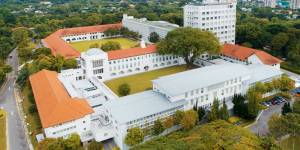what is the difference of LLM program between Tsinghua university law school and Peking university law school?
LLM in China
Posted Nov 12, 2012 03:01
Posted Nov 30, 2012 16:19
Off the top of my head, the PKU programme is notionally a 2-year programme. The first year will be coursework, and the second year is for a compulsory dissertation of considerable length. However, the residence requirement is only a single year, which means you may leave after completing the first year and submit your dissertation (and defend it orally) sometime later. You will be expected to return to Peking to do so.
The Tsinghua programme is designed along American LL.M. lines, i.e. it requires only a year in residence and extra time for the completion of a dissertation is not expected to be necessary.
Other cosmetic differences would be in programme fees. I believe the annual tuition for Tsinghua is steeper, but I am not entirely certain if Peking requires tuition for the second year if you do not intend to be in residence.
As to culture and student life, Peking is much more scholarly and it takes research extremely seriously. As such, foreign LL.M.s are given less attention (another factor is that there are simply just so many faculty able to teach or even converse intelligently in English). Tsinghua is more internationalized (i.e. it markets itself better) and it arguably caters to foreign LL.M.s better. After all, foreign LL.M.s are a cash cow.
As to comparative reputation, I must state clearly my bias: PKU has no equal. Tsinghua is something of an ingenue (as far as the law school is concerned) and upstart, but for all that it has achieved considerable successes. Think of it as a contrast between Oxford and UCL, the former is older, snootier, grander; the latter newer, more vibrant and energetic. According to a Tsinghua insider (a close friend of mine who is doing a bachelor's degree in engineering there), Tsinghua is less substance than form. Its marketing is first rate (PKU just more or less lets its reputation speak for itself). More top scorers in the Chinese provinces go to Tsinghua, but as far as the social sciences and law are concerned, PKU wins hands down.But foreigners don't get as much love; you're mainly cash cows.
Just apply to both if you are not sure. But a rule of thumb: PKU for the rigor and academics, Tsinghua for the networking and fun. (Applies only to a foreigner trying to do the foreigner LL.M.)
The Tsinghua programme is designed along American LL.M. lines, i.e. it requires only a year in residence and extra time for the completion of a dissertation is not expected to be necessary.
Other cosmetic differences would be in programme fees. I believe the annual tuition for Tsinghua is steeper, but I am not entirely certain if Peking requires tuition for the second year if you do not intend to be in residence.
As to culture and student life, Peking is much more scholarly and it takes research extremely seriously. As such, foreign LL.M.s are given less attention (another factor is that there are simply just so many faculty able to teach or even converse intelligently in English). Tsinghua is more internationalized (i.e. it markets itself better) and it arguably caters to foreign LL.M.s better. After all, foreign LL.M.s are a cash cow.
As to comparative reputation, I must state clearly my bias: PKU has no equal. Tsinghua is something of an ingenue (as far as the law school is concerned) and upstart, but for all that it has achieved considerable successes. Think of it as a contrast between Oxford and UCL, the former is older, snootier, grander; the latter newer, more vibrant and energetic. According to a Tsinghua insider (a close friend of mine who is doing a bachelor's degree in engineering there), Tsinghua is less substance than form. Its marketing is first rate (PKU just more or less lets its reputation speak for itself). More top scorers in the Chinese provinces go to Tsinghua, but as far as the social sciences and law are concerned, PKU wins hands down.But foreigners don't get as much love; you're mainly cash cows.
Just apply to both if you are not sure. But a rule of thumb: PKU for the rigor and academics, Tsinghua for the networking and fun. (Applies only to a foreigner trying to do the foreigner LL.M.)
Posted Nov 30, 2012 19:40
As to comparative reputation, I must state clearly my bias: PKU has no equal. Tsinghua is something of an ingenue (as far as the law school is concerned) and upstart, but for all that it has achieved considerable successes. Think of it as a contrast between Oxford and UCL, the former is older, snootier, grander; the latter newer, more vibrant and energetic. According to a Tsinghua insider (a close friend of mine who is doing a bachelor's degree in engineering there), Tsinghua is less substance than form. Its marketing is first rate (PKU just more or less lets its reputation speak for itself). More top scorers in the Chinese provinces go to Tsinghua, but as far as the social sciences and law are concerned, PKU wins hands down.But foreigners don't get as much love; you're mainly cash cows.
I concur.
If you are contemplating studying within the borders of the PRC and lack an aptitude in Mandarin. Stay away from the mainland. It would be ideal to consider Hong Kong. Your presence will be frown down upon while undergoing your LLM in the mainland. Especially being a foreigner.
Applicants should enquire: "why do you want to specialise in Chinese Law"?
I concur.
If you are contemplating studying within the borders of the PRC and lack an aptitude in Mandarin. Stay away from the mainland. It would be ideal to consider Hong Kong. Your presence will be frown down upon while undergoing your LLM in the mainland. Especially being a foreigner.
Applicants should enquire: "why do you want to specialise in Chinese Law"?
Posted Dec 27, 2012 02:38
this is just to confirm that tuition will need to be paid as well for the second year of the LLM in pku. you can essentially do whatever you wish in the second year, e.g. it's not necessary to do an internship. some people in my class went on back to their countries to start with work, some people stayed in china to do paid work, others did do internships with the intention of going back to their countries after. but we all wrote our thesis!
Posted Dec 28, 2012 13:23
Sir,
How was your experience at Peking? I have the following specific questions in mind but any anecdotes or additional information would be much appreciated.
1. Did you have opportunities to take classes with or interact with the locals in anything other than an official capacity?
2. How warm are the professors to consultations after class hours? Any particular stars to watch out for or people to avoid?
3. How much supervision did you get for your thesis? Are there some professors who are in principle more hands-off and aloof? Any really enthusiastic and mentor-ly ones?
4. Can you write your thesis early? I understand there is some sort of defense scheduled only at the end of the second year, but is there some way to rush things?
5. Are the professors supportive of students publishing work? Would they pull their connections for you?
6. How is the English language proficiency of the professors? Specific ones to watch out for?
7. How are Associate Professors Peng Bing and Deng Feng?
8. Any romantic successes between foreign students and locals to your knowledge?
9. What did students do for their second year and in what sort of percentages? Rough figures would be very welcome (e.g. 30% stayed and of those half interned, etc.)
10. Did you ever feel like just being a cash cow?
11. Did the average student receive a PRC government scholarship and if so how much?
How was your experience at Peking? I have the following specific questions in mind but any anecdotes or additional information would be much appreciated.
1. Did you have opportunities to take classes with or interact with the locals in anything other than an official capacity?
2. How warm are the professors to consultations after class hours? Any particular stars to watch out for or people to avoid?
3. How much supervision did you get for your thesis? Are there some professors who are in principle more hands-off and aloof? Any really enthusiastic and mentor-ly ones?
4. Can you write your thesis early? I understand there is some sort of defense scheduled only at the end of the second year, but is there some way to rush things?
5. Are the professors supportive of students publishing work? Would they pull their connections for you?
6. How is the English language proficiency of the professors? Specific ones to watch out for?
7. How are Associate Professors Peng Bing and Deng Feng?
8. Any romantic successes between foreign students and locals to your knowledge?
9. What did students do for their second year and in what sort of percentages? Rough figures would be very welcome (e.g. 30% stayed and of those half interned, etc.)
10. Did you ever feel like just being a cash cow?
11. Did the average student receive a PRC government scholarship and if so how much?
Posted Mar 05, 2013 03:04
Sir,
How was your experience at Peking? I have the following specific questions in mind but any anecdotes or additional information would be much appreciated.
1. Did you have opportunities to take classes with or interact with the locals in anything other than an official capacity?
----> i attended some law classes conducted in chinese, and i was included by my professor in a corporate law discussion group, and joined some activities with local chinese students. the classes and discussion groups were in chinese, so if you do not speak chinese, this may be difficult. but there are many opportunities to engage with local chinese students.
2. How warm are the professors to consultations after class hours? Any particular stars to watch out for or people to avoid?
----> the professors that i wanted to consult with were open for consultation outside of class hours. almost all that i wanted to communicate with by email were very responsive. shao jingchun for foreign investments, ge yunsong for contracts, peng bing for securities , zhang qianfan for conlaw and liu yan for EVERYTHING are all very highly recommended. even the chinese local students find them excellent so clearly, teaching ability transcends languages.
3. How much supervision did you get for your thesis? Are there some professors who are in principle more hands-off and aloof? Any really enthusiastic and mentor-ly ones?
----> yes, there are some who are more hands-off and some who are more enthusiastic. you will generally know who they are by asking around.
4. Can you write your thesis early? I understand there is some sort of defense scheduled only at the end of the second year, but is there some way to rush things?
----> you can write it early, but defense can only be done at the same time with other students.
5. Are the professors supportive of students publishing work? Would they pull their connections for you?
----> yes. i was able to co-publish a paper with a professor.
6. How is the English language proficiency of the professors? Specific ones to watch out for?
----> in the beginning, there is a little bit of adjustment needed to get used to the different accent, but after a while, it was not a problem. as i mentioned, the professors that the chinese local students liked the best were also the professors that we liked the best in our class, so teaching ability transcends language ability. of course, you can imagine how much better their chinese language classes would be since they would then be teaching in their own language, but their english language classes are already excellent.
7. How are Associate Professors Peng Bing and Deng Feng?
----> peng bing is excellent. deng feng i was not able to have as a professor but was very responsive by email when i asked him questions.
8. Any romantic successes between foreign students and locals to your knowledge?
9. What did students do for their second year and in what sort of percentages? Rough figures would be very welcome (e.g. 30% stayed and of those half interned, etc.)
----> about 70% did some form of internship in china, and about 30% went back to their countries to continue or start work. generally i thought that those who wanted to do an internship in china were able to do so.
10. Did you ever feel like just being a cash cow?
11. Did the average student receive a PRC government scholarship and if so how much?
----> about five people received merit scholarships (meaning partial tuition discounts) based on applications, and about five people received further tuition discounts determined on the basis of grades.
sorry for the delay! if you wish, you can send me a private message.
How was your experience at Peking? I have the following specific questions in mind but any anecdotes or additional information would be much appreciated.
1. Did you have opportunities to take classes with or interact with the locals in anything other than an official capacity?
----> i attended some law classes conducted in chinese, and i was included by my professor in a corporate law discussion group, and joined some activities with local chinese students. the classes and discussion groups were in chinese, so if you do not speak chinese, this may be difficult. but there are many opportunities to engage with local chinese students.
2. How warm are the professors to consultations after class hours? Any particular stars to watch out for or people to avoid?
----> the professors that i wanted to consult with were open for consultation outside of class hours. almost all that i wanted to communicate with by email were very responsive. shao jingchun for foreign investments, ge yunsong for contracts, peng bing for securities , zhang qianfan for conlaw and liu yan for EVERYTHING are all very highly recommended. even the chinese local students find them excellent so clearly, teaching ability transcends languages.
3. How much supervision did you get for your thesis? Are there some professors who are in principle more hands-off and aloof? Any really enthusiastic and mentor-ly ones?
----> yes, there are some who are more hands-off and some who are more enthusiastic. you will generally know who they are by asking around.
4. Can you write your thesis early? I understand there is some sort of defense scheduled only at the end of the second year, but is there some way to rush things?
----> you can write it early, but defense can only be done at the same time with other students.
5. Are the professors supportive of students publishing work? Would they pull their connections for you?
----> yes. i was able to co-publish a paper with a professor.
6. How is the English language proficiency of the professors? Specific ones to watch out for?
----> in the beginning, there is a little bit of adjustment needed to get used to the different accent, but after a while, it was not a problem. as i mentioned, the professors that the chinese local students liked the best were also the professors that we liked the best in our class, so teaching ability transcends language ability. of course, you can imagine how much better their chinese language classes would be since they would then be teaching in their own language, but their english language classes are already excellent.
7. How are Associate Professors Peng Bing and Deng Feng?
----> peng bing is excellent. deng feng i was not able to have as a professor but was very responsive by email when i asked him questions.
8. Any romantic successes between foreign students and locals to your knowledge?
9. What did students do for their second year and in what sort of percentages? Rough figures would be very welcome (e.g. 30% stayed and of those half interned, etc.)
----> about 70% did some form of internship in china, and about 30% went back to their countries to continue or start work. generally i thought that those who wanted to do an internship in china were able to do so.
10. Did you ever feel like just being a cash cow?
11. Did the average student receive a PRC government scholarship and if so how much?
----> about five people received merit scholarships (meaning partial tuition discounts) based on applications, and about five people received further tuition discounts determined on the basis of grades.
sorry for the delay! if you wish, you can send me a private message.
Related Law Schools
Other Related Content
LL.M.s in China: Studying Law in a Whirlwind Economy
Article Sep 06, 2016
Western students can use an LL.M. to learn more about China’s evolving legal system. But for lawyers who want to work in the country, there are a few things to keep in mind.
Hot Discussions
-
Cambridge LL.M. Applicants 2024-2025
Oct 30, 2024 141,891 544 -
Georgetown LLM 2024/2025 applicants
17 hours ago 39,825 209 -
Oxford 2025-2026 BCL/MSCs/MJUR/MPHIL/MLF
Nov 15 04:43 AM 1,885 44 -
NUS LLM 2024-25 Cohort
Oct 25, 2024 5,838 34 -
Warwick or Birmingham
Nov 10, 2024 1,159 5 -
LLM Technology law Germany in English lang.
Oct 21, 2024 822 5 -
NUS LLM cohort 2025/26
Nov 03, 2024 404 4 -
EU citizen barred in the US -- will an LLM from an EU school help me practice law somewhere in the EU?
Nov 15 12:58 AM 117 4




